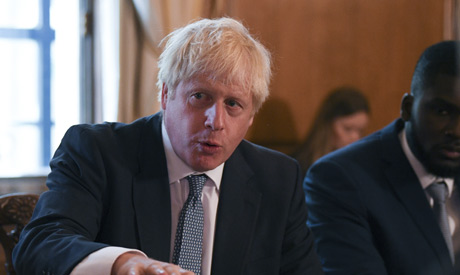
Britain's Prime Minister Boris Johnson speaks during a roundtable to improve the criminal justice system, at 10 Downing Street in London, Monday, Aug. 12, 2019 AP
The UK has started probing the possibilities of trade agreements with the six countries of the Gulf Cooperation Council (GCC) with no date for official negotiations yet being set. This might be part of new UK Prime Minister Boris Johnson’s strategy for preparing for the possibility of a hard Brexit — the UK leaving the EU with no deal — by 31 October.
Contacts aiming at increasing economic cooperation through trade and investment between the UK and the GCC countries have been ongoing for a couple of years, intensified after the Brexit referendum of 2016. Though a UK-US trade deal might be a priority for Johnson, the Gulf region is of no less importance.
However, the main Gulf countries, particularly Saudi Arabia and the United Arab Emirates (UAE), were cautious about supporting Johnson’s bid to lead the United Kingdom. The hype that followed the election of US President Donald Trump to lead this strong Gulf ally in 2016 was not seen when Johnson won the Conservative Party leadership and became prime minister in the UK.
Some analysts say that the caution over Johnson’s win was expected, while Trump’s election victory was a surprise even to his supporters. Another reason is that Trump was almost guaranteed a full term of four years in office, while Johnson is simply replacing former UK prime minister Theresa May who stepped down in mid-term.
Gulf sources indicate that the new UK prime minister now has some months to show his resolve and assure the world that he will carry out UK foreign policy commitments. However, the Brexit negotiations may become more complicated and force him to step down before the end of the year, and a snap election is not guaranteed to bring him back with a wider mandate.
There has also been escalating tension between the UK and Iran, after the Iranians detained a British-flagged tanker last month following Britain’s detention of an Iranian oil tanker in Gibraltar claiming that it had violated international sanctions on Syria.
The escalation started under the outgoing prime minister, but it was a challenge for Johnson from day one. Some expected him to take a tougher stance against Iran, drawing closer to the American position in the crisis, and his actions were well-calculated to keep the UK within the fold of the sole remaining superpower while still trying to save the Iran nuclear deal.
Other Gulf pundits say that Johnson could be a better partner for the GCC countries than his predecessor May and even her predecessor David Cameron. They explain the cautious approach towards a Johnson-led UK by citing the difference between the Gulf relationship with the US and its traditional relationship with the EU in general and the UK in particular.
Trade and investment could be the best way to improve Gulf-UK relations, and Johnson is trying to encourage that approach away from traditional establishment thinking, with some in the UK still looking at the Gulf as part of the defunct British Empire.
With a no-deal Brexit now more likely in October, the British pound is set to keep falling in value, encouraging Gulf investors to pour more money into the UK property sector. Almost all the Gulf countries’ currencies are pegged to the US dollar, which leads to trade advantages for the UK thanks to the weak pound, so new trade deals may not be hard to negotiate.
When the UK is outside the EU, it will take with it the largest portion of EU-GCC trade.
The EU remains the number one trading partner for the GCC, while the EU is the region’s sixth-most important trading partner and fourth-most important export market. In 2017, overall EU trade with the GCC reached around 143 billion Euros, with 100 billion Euros in EU exports to the Gulf countries.
Almost a third of that trade is between the GCC and the UK. Trade between one Gulf country, the UAE, and the UK totalled 17.5 billion British pounds in 2017, while UK trade with Saudi Arabia was even more than that
It is not only trade, investment and Iran that matter for the GCC states when it comes to relations with the UK. A thorny issue has long been dissidents, especially Muslim Brotherhood and similar militants living in the UK.
The Gulf countries asked previous British governments to consider curbing activities led by such dissidents targeting the destabilisation of the Gulf countries.
Cameron’s government launched a review of the Brotherhood in Britain that did not lead to outlawing it as a terrorist organisation. London and other cities in UK are still home for Brotherhood leaders, along with Al-Qaeda and other terrorist individuals.
Johnson is expected to take a tougher position against those groups, but it might not be a priority for him as Brexit occupies the largest space of government action. Some in the Gulf note the reaction of the groups to the rise of Johnson as a good sign.
Once Johnson was announced as the new UK prime minister, one Saudi dissident granted residency by the UK, Mohammed Al-Massari, tweeted a picture of Johnson with a caption reading “this Zionist prepares for the leadership of Britain.” Others like Al-Qaeda supporter Abu Hamza Al-Masri did the same.
Short link: